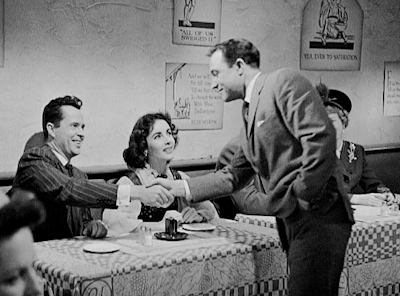Let's All Go to the Commissary
In my search for Old Hollywood ephemera, I stumbled upon a menu
from the MGM commissary from the late ‘50s and it prompted a further
exploration of the commissaries of MGM, Warner Brothers, Paramount and other
Old Hollywood studios.
This post is brought to you by my discovery of Cyd Charisse
Salad last year— basically shredded lettuce, celery, tomato and melba toast covered
in a cottage cheese/sour cream mixture—and I regret to inform that it’s done
nothing to give me those enviable legs, but it’s still a light, delicious
lunch.
I’ve yet to try the Elizabeth Taylor Salad—mixed greens with
julienned slices of deli meats and Swiss cheese in a wine vinegar/oil
dressing—but it sounds good.
The studio commissary was often the most happening place on
the lot: everyone ate there. The directors, the contract players, the stars,
the writers, the technical crew, even the studio big-wigs—granted, they were
insulated against just anyone showing up to eat.
Even the directors, at MGM anyways, were protected. According
to the website ‘Film Talk’, the directors had a long table in the MGM
commissary with a special chair reserved for Clark Gable whenever he deigned to
eat there. The waiter would also come running with a newspaper whenever he saw
Gable. Pays to be ‘the King’, I guess.
In 2019, Pauline Kessinger’s unpublished memoirs were
discovered, and they revealed the eating habits of Old Hollywood stars who
dined at the Continental Café on the Paramount lot, where she worked for 40
years.
According to Kessinger, William Holden always dined with the
studio lawyers and the female stars often exchanged recipes.
As for kooky offerings, Kim Novak once dined on ‘Kim Novak
Purple Salad’, a recipe achieved by making grape Jell-o and adding fruit to it.
“Before I met her I thought Kim Novak's passion for purple was a publicity
stunt, just pure hokum, but after she came to the studio I wasn't so sure. I'm
still not, because she not only wore purple, she ate it as well — in the form
of a Kim Novak Salad we put on the menu in her honor. It is the use of vinegar
that gives this its added zing,” Kessinger wrote.
According to Lion of Hollywood: The Life and Legend of
Louis B. Mayer by Scott Eyman, the MGM Commissary was designed by Cedric
Gibbons and could sit 225 people at one point. It was famous for chicken soup
and the head chef shadowed Mayer’s film editor and assistant Margaret Booth so
that he could replicate her recipes.
Eyman’s book is full of gossip, like how Lionel Barrymore had
exclusive bacon that nobody else could eat; John Barrymore had his own coffee
brand; and Wallace Beery never tipped because tips were reserved for special
service and as a famous movie star, he always got special service so it was
viewed as a waste of money.
Over at the Paramount Studios commissary, the Café Continental,
you could order a Bob Hope Cocktail (tomato juice, yogurt and a dash of lea and
perrins) or a Martin & Lewis Special High Calory Diet for $64,000—I’m
assuming that’s a joke—that consisted of egg foo fish and almond crisp plateau
salmon with egg shell, and could only be eaten in an isolation booth.
You could also order a Dorothy Lamour Salad, which sounds
delish: pineapple, sliced bananas and strawberries with Cream Cheese Bar le Duo
(if anyone know what that is, comment! I want to make this!).
It’s also fun seeing the commissaries appear in gossip back
then. The main actors from The Wizard of Oz allegedly never ate in the
commissary because of the gawking they got in their costumes—and the touch-ups
were murder, so they couldn’t really eat properly anyways.
In the ‘90s, the MGM commissary was renovated—and under new
ownership by Sony Pictures. It was renamed the Rita Hayworth Dining Room, which
is notable because Rita was never an MGM star; she was firmly a Columbia
player.
According to the Los Angeles Times, the Rita Hayworth
Dining Room featured “classic Art Deco style dining room is appointed with
customized Tiffany china and flatware, expensive fresh flowers and a baby grand
in the corner.” There were framed pictures of Old Hollywood stars all over the
walls and the waiters wore black-and-gold striped vests.
One menu item paid tribute to Louis B. Mayer and Harry Cohn: Matzo Ball Soup, which both insisted on serving in their respective commissaires back in the day.
___
Photo credits: MGM commissary menu via yesterdaytoday, Paramount commissary menu source unknown




Comments
Post a Comment